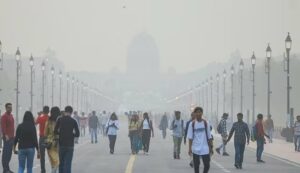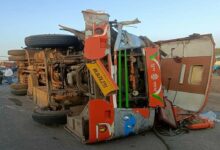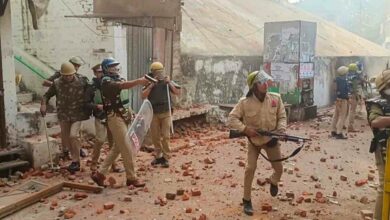GRAP Stage 2 implemented in Delhi-NCR due to poor air quality
New Delhi: The Commission for Air Quality Management (CAQM) activated stage two of the anti-pollution strategy GRAP this morning due to the deterioration of Delhi‘s air quality index (AQI) during the last several days.

The System of Air Quality and Weather Forecasting and Research (SAFAR) provides real-time statistics, and at 8 am, Delhi’s AQI was 317, falling into the “very poor” category. Good AQIs range from 0 to 50, tolerable AQIs range from 51 to 100, moderate AQIs range from 101 to 200, bad AQIs range from 201 to 300, very poor AQIs range from 301 to 400, severe AQIs range from 401 to 450, and severe-plus AQIs fall over 450.
The India Meteorological Department (IMD) has anticipated that, due to unfavorable climatic and meteorological circumstances, Delhi’s daily average AQI would remain in the “very poor” category for the foreseeable future. Delhi’s increased pollution levels are often attributed to stubble burning in nearby Haryana and Punjab, particularly in the months of October and November after harvest.
In the Delhi-National Capital Region (NCR), the usage of diesel generator sets and coal and firewood would be restricted under stage two of the Graded Response Action Plan, or GRAP.
Dust control measures will be enforced at construction and demolition sites, and daily mechanical sweeping and water spraying will be performed on designated routes.
In addition, more bus and subway services will be launched, traffic officers will be stationed during traffic jams, and parking prices will be raised to deter private transportation.
It has been suggested that people utilize public transportation more often and drive their own cars less. Additionally, they have been requested to refrain from dust-producing building activities from October to January and to change their cars’ air filters on a regular basis at the required intervals.
Additionally, residents of Delhi-NCR have been advised not to burn biomass and solid trash outside.
The GRAP Stage 1 measures, which have been in place since October 15, are supplemented by these actions. In addition to dust reduction at building sites, Stage 1 involves periodic mechanized sweeping and water spraying on highways. Additionally, the use of coal or firewood in restaurants, the open burning of rubbish, and the restricted use of diesel generators are all prohibited.
Limitations in Stage 3
When the AQI stays between 401 and 450, the GRAP is enforced in Stage 3. The following actions are then taken:
- Roads and hotspots should have more regular mechanized road cleaning, daily watering, and dust suppressants applied before high traffic hours.
- Increase the intensity of public transportation services and set prices to promote off-peak travel.
- Put an end to stone-crushing and mining operations.
- Tight limitations on BS lV diesel and BS lll gasoline LMVS (4-wheelers), severe limitations on Delhi-registered diesel-operated MGVS to BS-lll standards, prohibitions on BS-lll and lower diesel-operated LCVS (goods carriers) registered outside Delhi, and prohibitions on interstate buses from NCR states beyond EVs, CNG, and BS-Vl diesel,
- Children up to Class V may no longer attend physical lessons in schools.
- Severe restrictions on building and demolition operations.
Limitation at Stage 4, When the AQI Exceeds 450
When the Delhi AQI hits 450, or the severe-plus category, stage 4 of the GRAP is put into effect.
The following actions are then taken:
- Trucks are no longer allowed to enter Delhi.
- prohibition on building and demolishing linear public projects, including roads, flyovers, overbridges, electricity transmission, pipelines, telecommunications, and highways.
- Physical courses, particularly those for courses Vl-lX and Xl, may be discontinued by the government.
- The government may decide to let 50% of employees in public, municipal, and private workplaces work from home.
- Other emergency actions that state governments may take include closing schools and other educational facilities, stopping non-emergency commercial operations, allowing cars to be driven on an odd-even basis based on registration numbers, etc.
- People with respiratory, cardiovascular, cerebrovascular, or other chronic illnesses, as well as children and the elderly, should remain inside and refrain from outside activities.
In an effort to combat air pollution, the Delhi government also started its “Red Light On-Gaadi Off” campaign earlier on Monday.
Gopal Rai, a prominent Aam Aadmi Party (AAP) politician and Delhi Environment Minister, launched the campaign at the ITO crossroads by urging motorists to turn off their car engines at red lights in order to help decrease pollution.
Mr. Rai said that the Delhi government is spraying bio-decomposer over 5,000 acres to break down stubble, has established a green war center to fight pollution, and started an anti-dust campaign to reduce dust pollution.





